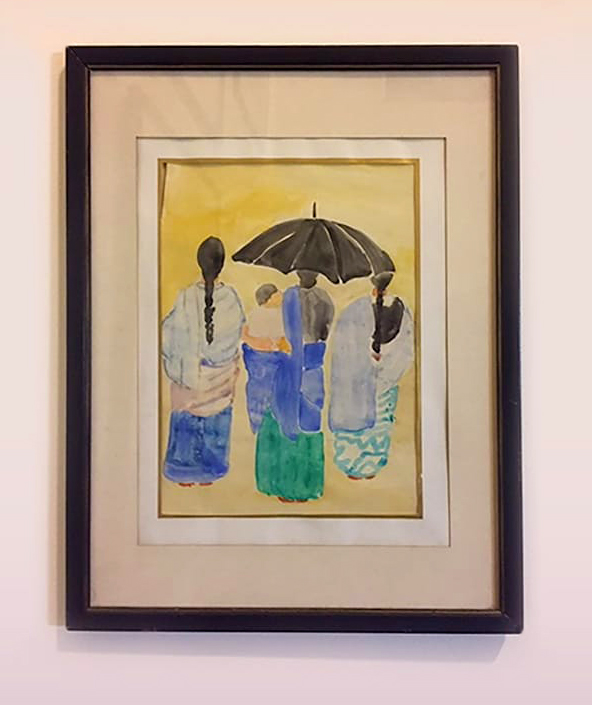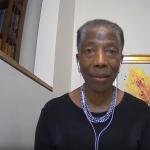Cerberus is a blog series. To start reading from the beginning, click here.
I went back to graduate school in 1979 to figure out why nothing in my successful career life and no one in my personal life could satisfy me. I earned a Master of Arts degree in the History of Religion program at UCLA in 1982 and then transferred to Claremont Graduate University in Claremont, California for doctoral work in the philosophy of religion and theology. I studied religious and philosophic texts about human emotions, hoping to figure out the real meaning of my own darkened emotional life.
Perhaps a wiser course would have been for me to leave everything behind and become a poet, even if not a very good one. Poets, after all, can turn feelings into thoughts because poets focus on the sound, rhythm, timbre, and other movements of their feelings. Each movement becomes the word made flesh, the logos of an anointed life.
Perhaps a wiser course would have been for me to leave everything behind and become a poet…
But I was not a poet. I was a television producer who had simply lost her way. So I turned to the place that I knew best—books—to find a pathway inside me.
The trek began not so much as a vision quest, but rather as a drive down Los Angeles freeways to find something new to think about. I lived in a penthouse apartment on the Venice Beach just west of LA, and, after I became a doctoral student, I drove to Claremont—a small, affluent college town about 60 miles east of LA—three days a week for my coursework.
Cerberus was waiting for me there. But with a different person: Mom. I didn’t see him right away. First, I had to ask the right questions.
I would sometimes pay a perfunctory visit to my parents, who were now residents in Pilgrim Place, the retirement village in Claremont for Christian ministers, missionaries, and academics. Then I would quickly scurry away to a seminar or back to my office at KNBC in Burbank to work the phones, line up and pre-interview guests, and then tape a show on Tuesday nights.
The show-biz sideshow stopped in 1984, when KNBC local management told me to produce 10 one-minute specials on Black History for Black History Month. I had written and produced a series of mini-drama Bicentennial Minutes in 1976 called “The Rebels” that NBC broadcast nationally over its five owned and operated stations. Now, local station management wanted me to write and produce more one-minute shows. But this time, without a comparable budget. I would simply have to use one of our local newscasters to read a one-minute statement I would write about something notable a black person had done.
I was ordered, in effect, to create boring instructional TV and call it the black experience.
I rebelled and created 10 one-minute mini-drama histories, using black celebrities like Maya Angelou, Esther Rolle, Beah Richards, Robert Guillaume, and Louis Gossett Jr. to star in the one-person dramatized stories with elaborate sets depicting great moments in Black American history.
The network loved the shows, sandwiched a commercial into each one, and made money.
KNBC local station manager, however, was livid. I had gone so far over budget in producing these shows with their elaborate stage sets and special effects that the local station lost money. My talk show was cancelled to recoup the money the local station had lost, and I was fired.
The official declaration of independence from my sixteen-year television career was made to my parents the evening of the day I was sacked. I had been fired on my birthday. We had made plans for them to take me out to dinner.
“I have good news and bad news,” I told them as soon as I entered their home. “Which would you like to hear first?”
“Oh, the good news,” Mom immediately said, as both of them sat down on the living room sofa.
And so I began: “My show has just been cancelled and I have been fired. I will not look for another job in `the industry,’ but will now move to Claremont and become a full time doctoral student.”
Ashy and aghast, Mom said, “If this is the good news, what’s the bad news?”
“The same information from your perspective.” This statement was my declaration of independence speech. I would no longer try to meet any of their expectations about how I should feel or live my life. Their rule over me was at an end.
Dad started to argue, to rant and to rave. Mom quickly put her hand on his knees and said, “Booker, stop. She has already made up her mind. There’s nothing we can do.”
Who was this woman? She had not only stopped Dad from badgering me, but she also protected me. She had always deserted me. She had always refused to help me out. She had always sidelined me. She had always turned away from me, except for one other time.
Mom’s response to my declaration of independence struck an emotional chord in me that my mind could not ignore.
Who was this woman? She had not only stopped Dad from badgering me, but she also protected me.
A memory came to mind of something she had done two years earlier as the three of us talked on the phone. I had just told my parents about one of my professors, a world-renowned philosopher at UCLA, and said I had begun to argue in class with him over his interpretation of texts. It took me a week of jaw clenching and teeth gnashing before I finally got up the courage to speak up in class and publicly “correct” his analysis of Kant. He was shocked. No one did that to him.
My parents freaked out. “Oh, no,” Mom said. And Dad chimed in, “What do you think you are doing? Are you crazy? What are you trying to prove?”
And then for the first and only time in my life I swore at them, saying, “I will be damned if I am going to let you push me into silence and depression again. I struggled with this decision for a week and I am not going to let you turn my personal victory into shit.”
There was a very long deadly silence on the phone. And then Dad said, “Have you finished?”
“Yes,” I said. And he hung up the phone.
He always slammed down the phone and walked away from anything and anyone who did not conform to his expectations. I expected no less from him because his loyalty wasn’t given but earned. I didn’t want those earnings anymore and now leveraged my own value by jerking the phone away from my ear for a mid-air slam-dunk finish.
As I started to slam down the phone, I heard Mom saying, “Oh please don’t hang up the phone. Please don’t hang up the phone.” She had never spoken that way to me before. Her voice was solicitous, invitational, and emotionally vulnerable. She was plaintive.
“Alright,” I said, calming down. And then I went silent.
Mom spoke from a place where I didn’t know she lived: fear. “Anytime you feel as if we are forcing our fears on you,” Mom began, “you must speak up. Your father and I grew up during an era in which Negroes were lynched, and we lost and gained jobs at the whim and rule of whites. So we never spoke out against whites in ways that would put us personally at risk.”
Mom spoke from a place where I didn’t know she lived: fear.
She had hidden her fear from me. But now she showed it to me, and a new set of questions came to mind. Had Cerberus been her companion, too? Together, had they mastered the art of making her bad feelings—her fear—disappear? Did they sculpt her negative feelings into art?
I had asked the right questions. Mom’s life story now had a new narrative: She had painted, molded, pounded, and shaped her emotions into sadness art. Cerberus had not taken her sad feelings to hell, he had interred them, buried them in her art.
 In Washington, in the 1930s, Mom studied watercolors with the award-winning Howard University artist Lois Mailou Jones who had spent a great deal of her life in France. The elongated structures and somber figures in Mom’s paintings spoke to this early influence on her work. The figures carved in wood, such as the Quiet One, Madonna and Child, and Weeping Mary, overcast the moment with an in-folding aloneness of remorse. Many of her clay figures leaned into the corners of sadness. The Weeping Woman, a thick earth-bound body of strength, rests its head on the shoulder of her own sorrow. Countless figures have their faces buried in their hands. Wire limbs provide the foundation of her clay figures; their long, semi-abstract bodies with faceless features leaning ever so lightly into the next moment, as if the premise of the next moment was its mournful past. And everywhere, her triangular clay shapes and designs appeared and disappeared into themselves.
In Washington, in the 1930s, Mom studied watercolors with the award-winning Howard University artist Lois Mailou Jones who had spent a great deal of her life in France. The elongated structures and somber figures in Mom’s paintings spoke to this early influence on her work. The figures carved in wood, such as the Quiet One, Madonna and Child, and Weeping Mary, overcast the moment with an in-folding aloneness of remorse. Many of her clay figures leaned into the corners of sadness. The Weeping Woman, a thick earth-bound body of strength, rests its head on the shoulder of her own sorrow. Countless figures have their faces buried in their hands. Wire limbs provide the foundation of her clay figures; their long, semi-abstract bodies with faceless features leaning ever so lightly into the next moment, as if the premise of the next moment was its mournful past. And everywhere, her triangular clay shapes and designs appeared and disappeared into themselves.
Her Cerberus was also her artwork in me. As a child, I became one of Mom’s art pieces sculptured against the grain of my own feelings.
Her Cerberus was also her artwork in me.
First came the exhaustion. By age seven, I was so depleted of energy by the constant undertaking of creating myself in her image of me that I walked bent over like Atlas with the weight of the world on his back. Her response to my poor posture was classic Mom 101: “If you do not stand up straight, I will buy a back harness and make you wear it.” Her verbal flogging increased as my posture and morale worsened.
Next came the self-condemnation. Clearly something must be wrong with me, I concluded during that time of my life, because Mom was perfect. She never cursed, screamed, or ranted and raved. She was the very picture of poise and quiet dignity. And she was an artist. I, in contrast, was an unholy mess. Nothing I did was ever quite right. When I was eight and tucked away safely in my room playing with my dolls, she called me to her side as she sat in front of her small dressing table. “Now what have I done wrong?” I said plaintively as I peered into her eyes. She blinked several times. I watched her face collapse into remorse and then her flash of self-awareness of the relentless way she treated me was gone as she said, “Oh, never mind.” I returned to my room. But I didn’t feel victorious. Her flash of insight come and gone marked my loss.
So I would close my eyes for a few seconds once every hour or so during the day to ask God to forgive me for the sins I had just committed. I wasn’t sure what I had just done that was so bad and wrong, but I knew I must have done something wrong because I was a bad child. Why else was I always monitored and corrected?
Finally, the shame showed up. At 12, when I complained to Mom that classmates were taunting me at school because my feet were so long, she dutifully showed me that my feet were perfectly proportioned to my arms, by having me ever so carefully place my foot on my arm. “See,” she said, “your toes and heel fit perfectly between your elbow and wrist.” Mom, of course, knew about this kind of proportionality because she was the artist. I felt better. A week later, however, she told me that my arms were too long. So I should always put my hands in my pockets when walking, or bend my arms at the elbows so that no one could see how long they are.
I would close my eyes for a few seconds once every hour or so during the day to ask God to forgive me for the sins I had just committed.
Other mandates followed: I should always position myself so that the person to whom I was speaking could see my right profile because that was the pretty side of my face. Some of her mandates were unspoken. She would rub lemon halves on my kneecaps as if they were a juicer, trying in this way to bleach them because they were too dark. In truth, I was too dark for her liking. Thus her real dictate to me: fade away.
These strategies wiped away my conscious awareness of what my body felt: anger, confusion, loss, sorrow, and so much more. Unwanted before or after my birth, I had learned early on that I was physically, emotionally, and temperamentally ill-equipped to be her child. I was ashamed of myself. I was unloved, I concluded, because I was unlovable.
Dad picked up the other phone again as Mom continued to reveal her own battered emotions to me. When she had finished, Dad said to me, “That’s right. Speak up when you feel something wrong is being said. Don’t let our fears stymie you.” Gone was his screed on nobly hiding anxiety. He didn’t try to freeze my anguish; he celebrated the way I removed it as a guiding principle of my life.
We were silent for a long moment, and then Dad said, “What are you doing for lunch?”
“Nothing,” I said.
“Well, why don’t you drive out here, and we will take you to lunch.”
At lunch, we didn’t talk about our fears and vulnerabilities. Pod people don’t do that sort of thing. We don’t explore feelings; we ignore emotions; we erase sentiments by talking about art and theology and, of course, the movies. But this time we did so with a particular delight and gusto that turned our meal into a royal banquet feast.
Now, two years later, when Mom again showed up as an advocate on my behalf, I made a silent vow to get to know this part of my mother guarded by Cerberus.
I had given up the expectation long ago that I would ever know her in any other way than as a woman whom I always seemed to disappoint. In truth, I could not think of anything about me that she really liked. She approved of my television career and the awards I won. And she liked to buy things for me. But none of these activities made me feel as if I had a mother who actually liked me. That kind of personal emotional attentiveness was not in her mother-portfolio as I grew up. Might something caring be in there for me now?
Some unknown part of me was intrigued and prompted me to try an experiment. From now on I would hug my mother and father whenever I greeted them. With this simple display of emotions on my part, I reasoned, I would force her either to keep me at arms’ length by pushing me away – or embrace me.
We didn’t do “hugs” in my family or, for that matter, display any kind of positive affection toward one another except through the purchase of exorbitantly expensive Christmas and birthday gifts. So my decision to start hugging my parents as part of my hellos and goodbyes to them was huge. It broke a pod people rule because it was a public sign of a positive, healthy emotional affection. I resolved to take this step to find out how the woman who had stuck up for me twice really felt about me.
The first time I hugged Mom, she froze in terror but did not step back. Dad simply took the hug in stride.
By the end of Mom’s life, we hugged each other like the best of friends because we were. Not so with Dad.
By the end of his life, Dad’s mental condition had deteriorated because of the series of small diabetic strokes to his brain. He had to be drugged and strapped to a wheelchair, otherwise Pilgrim Place would have sent Dad to a hospital for the insane.
Mom and I started hanging out together. We shopped ‘til we dropped. We laughed a lot. And I plotted with “Buddy,” her closest friend at Pilgrim Place, to put together a surprise birthday party for Mom. When I unlocked the door to my apartment and let Mom open it so that we could enter and have cake and ice cream after a day spent in Los Angeles, 25 Pilgrims shouted together “Surprise!” as each of them also snapshot that magical moment, which turned my living room into a star burst of electric light. Mom was so overwhelmed that she turned away from the door, buried her head in her hands and cried. Then she turned around and entered the joyous fray, collapsing in Buddy’s arms jubilant and alive. I had never ever seen my mother cry with heartfelt joy before. Who was this woman I was now getting to know?
When Mom told me that I was her best friend, I asked if I could call her Erma. She grinned, her face filled with delight, as she said “Oh, yes!”
The immediacy of her positive response caught me off guard. I seemed to have found a door, opened it, and entered into a part of herself never before disclosed to me. I felt her joy and care for me. I saw her joy and care for herself. I had entered the place where she spent most of her life: the room guarded by the sculptured, mourning bodies she carved to block the dark entranceway to her heart.
Cerberus guarded the gate to this place. He opened the gate and let me in. Paradoxically, this first step into hell was my first step out of hell: I had invited caring and compassion back into my life. Mom had always written her name as Erma Beatrice Barbour Booker. (She had never given up her maiden name.) So I now called Mom “Erma B,” shortening Beatrice to “Bee” to “B.” She was now my best friend, too.
So I wasn’t surprised when she started calling me “Thandi,” without a moment’s hesitation.
Chapter 5, Loveable? >
This blog series and all other materials on this website have been offered to you at no cost. New chapters will be released at regular intervals. If you like this blog and find it useful, please consider making a donation to support Rev. Dr. Thandeka’s work.
Click here to donate: |










Post a comment